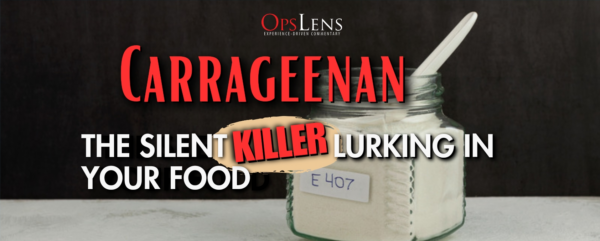In the world of food additives, there exists a seemingly innocuous ingredient that has been causing quite a stir in the health-conscious community. Carrageenan, a commonly used additive in processed foods, is not as harmless as it may seem at first glance. Let’s delve into the depths of this controversial substance and uncover the truth behind its potential dangers to human health.
What is Carrageenan and Why is it Used?
Carrageenan is a naturally occurring polysaccharide extracted from red seaweed, primarily used as a thickening and stabilizing agent in various food products. Its gelling properties make it a popular choice in food production, where it is commonly added to dairy alternatives, processed meats, sauces, and even some beverages. Introduced into the food system in the 1950s, carrageenan has become a staple in many processed foods, not for holding any nutritional value but for its ability to improve texture and shelf life.
The Dark Side of Carrageenan: A Threat to Gut Health.
Despite its widespread use, carrageenan has come under scrutiny for its potential adverse effects on human health, particularly on gut health. Numerous studies have linked carrageenan consumption to inflammation, digestive issues, and even the development of gastrointestinal disorders. This controversial additive has been shown to disrupt the intestinal barrier, leading to increased permeability and potential harm to the gut microbiome.
Furthermore, some researchers suggest that carrageenan may trigger an immune response in the body, contributing to chronic inflammation and other health complications. For individuals with preexisting digestive conditions such as IBS or IBD, the consumption of carrageenan-containing foods may exacerbate symptoms and worsen overall gut health.
Foods to Watch Out For and How to Avoid Carrageenan.
Carrageenan can be found in a wide range of processed foods, making it challenging for consumers to avoid it entirely. Common culprits include dairy alternatives like almond milk and coconut milk. It’s seen in puddings, jelly, and ice cream, as well as processed meats, sauces, and even some infant formulas. To steer clear of this potentially harmful additive, it is essential to read food labels diligently and opt for whole, unprocessed foods whenever possible.
In conclusion, while carrageenan may enhance the texture and stability of processed foods, its potential risks to human health cannot be ignored. As awareness grows regarding the detrimental effects of this additive on gut health, consumers are encouraged to make informed choices and prioritize the consumption of whole, nutrient-dense foods free from carrageenan. Stay vigilant, read labels, and take charge of your health by steering clear of this silent threat lurking in your food.
– Happy Healing from Hooser Health 🌿


















